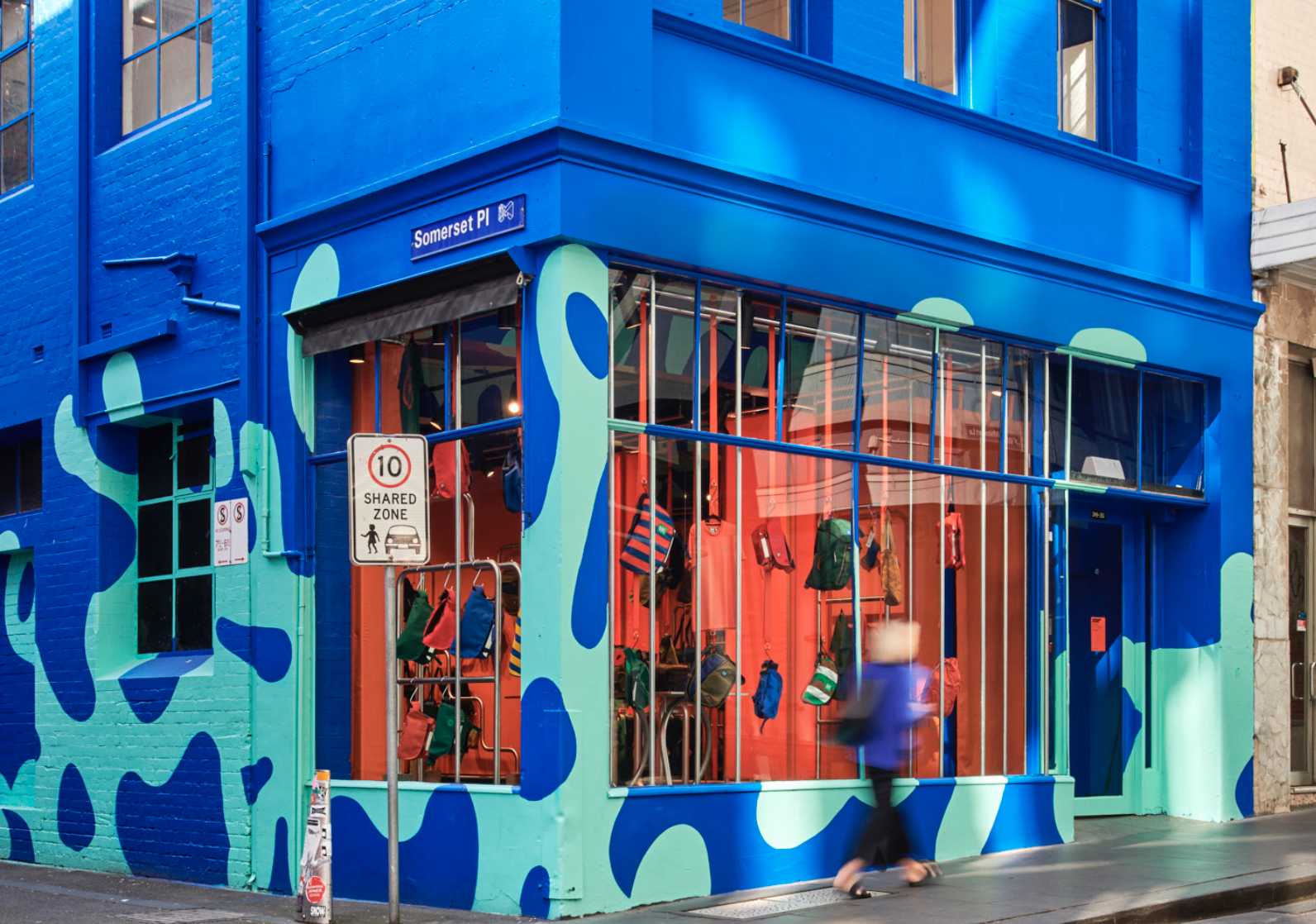Aussies Seek Sustainable Shopping: The Rise and Impact of B Corp Certification in Australia
As more businesses sign up for certification, sustainably minded consumers take note
Shopping never used to be this hard. Once a matter of whether there was enough cash in your wallet or room on your credit card, now consumers are becoming increasingly concerned about the cost of buying something new not just for themselves, but the planet as well. Nearly 60 percent of Australians value sustainability more than they did two years ago, according to a recent survey by market analysts NIQ.
Yet just 37 percent say they could shop sustainably with ease versus
a global average of 50 percent. Bombarded with slogans and social media touting a brand’s “eco- friendly” or sustainable credentials, consumers struggle to cut through the greenwash.
Environmental claims are a powerful marketing tool and in Australia it is illegal for business to make false ones. But for customers or investors looking for certainty, the market has provided it through a growing movement called B Corp.
Companies that meet high sustainability standards can attain B Corp Certification — an internationally-recognised tick of approval. It was introduced by B Lab, a United States non-profit organisation founded in 2006 by three friends wanting to make business a force for good.
Companies have to prove to B Lab they’re making a positive impact on the “quadruple” bottom line: people, planet, profit, purpose.
‘B’ stands for ‘benefit for all’ and the fee-based application process is rigorous.
Unlike Environment, Social and Governance (ESG) reporting frameworks, B Corp measures a company’s entire footprint, from supply chain practices and input materials to employee benefits and governance structures.
Businesses submit detailed evidence to B Lab on these standards and must be scored 80 or above on their B Impact Assessment. Once verified, a company’s score appears on the global B Corp Directory.
They can also use the distinctive B Corp logo — an encircled black B — in marketing.
While B Corps don’t carry any particular legal or government status in Australia, the logo carries weight with consumers.
“Most market research finds
that the most important thing to consumers is a company’s reputation or credentials,” Emma Herd, EY Oceania Partner in Climate Change and Sustainability Services, says.
“B Corp Certification is a
quick and recognised way of demonstrating you are taking voluntary action to address sustainability issues that affect your markets, consumers and banks.”
There are more than 6,000 B Corps globally, including about 470 in Australia and New Zealand.
Big names include Danone and Patagonia.
The latest Australian business to join the ranks is designer furniture and lighting supplier Living Edge.
With showrooms nationwide, the luxury retailer has a 15-year history of sustainable practice, from partnering with eco-friendly brands to using electric vehicles.
Living Edge Sustainability Strategist Guy Walsh says that certification — a “great validation of what we have achieved so far” — has provided pivotal business insights.
“We always believed we had a sustainable portfolio of products but going through the B Corp certification process was the first time we could look at an actual metric,” Walsh says.
“We found in the 2021-22 financial year, 69 percent of our revenue was generated from the sale of products certified to internationally recognised environmental accreditations.
“Another one that I found interesting, and which is so important for creating industry circularity, is that 21 percent of our revenue is coming from recycled materials. This data gives us a clear baseline to improve on.”
Constant improvement lies at the heart of B Corp. Businesses must recertify every three years as standards evolve. Australian firm WOWOWA Architecture, known for its whimsical and sustainable creations, was recently recertified after gaining B Corp status in 2019.
Director Monique Woodward says they “lost some points but gained others and that’s OK.”
She says certification has provided a “road map for growth” and helped the firm attract environmentally- focused clients.
“Our favourite residential family clients come to us because they believe what we believe, then also want a deliciously colourful and wildly textured home,” Woodward says. “Crumpler came to us wanting a fresh but nostalgic look thatspoke to their motto ‘bags that will probably outlast you’. We are now doing all their stores.”
For Woodward, industry and supply chain sustainability can improve if more firms jump on the B Corp bandwagon.
“Moving forward, all projects need to far exceed current regulatory requirements. Award winners
need to push hard and set new benchmarks for zero carbon, no waste, no gas as the bare minimum,” she says.
According to B Lab, B Corps are 4.5 times more likely than other businesses to use 100 percent renewable energy and 7.3 times more likely to be carbon-neutral.
EY Oceania sustainability expert Herd says the pressure is on business to be more sustainable.
“The investment thesis of ESG and sustainability is that a well-managed company on ESG credentials is generally better run and more profitable,” she says.
“We are seeing it’s harder for companies to do nothing on sustainability and ESG. We’re also seeing an increased push from business in Australia to government to provide consensus building around accredited certification schemes. There is a hunger from business to have a benchmark.”
For newly-minted B Corp Living Edge, certification is a gamechanger for business and consumers.
“Now we have got a measure for how sustainable our products are, we can be more targeted when we bring brands to market,” Walsh says.
“Our brand is not about throwaway consumables or fast furniture. We’re building a socially responsible and sustainable business. B Corp Certification is valuable to our customers because it gives them third-party assurance that we’re trying to do the right thing.”
This stylish family home combines a classic palette and finishes with a flexible floorplan
Just 55 minutes from Sydney, make this your creative getaway located in the majestic Hawkesbury region.
As Paris makes its final preparations for the Olympic games, its residents are busy with their own—packing their suitcases, confirming their reservations, and getting out of town.
Worried about the hordes of crowds and overall chaos the Olympics could bring, Parisians are fleeing the city in droves and inundating resort cities around the country. Hotels and holiday rentals in some of France’s most popular vacation destinations—from the French Riviera in the south to the beaches of Normandy in the north—say they are expecting massive crowds this year in advance of the Olympics. The games will run from July 26-Aug. 1.
“It’s already a major holiday season for us, and beyond that, we have the Olympics,” says Stéphane Personeni, general manager of the Lily of the Valley hotel in Saint Tropez. “People began booking early this year.”
Personeni’s hotel typically has no issues filling its rooms each summer—by May of each year, the luxury hotel typically finds itself completely booked out for the months of July and August. But this year, the 53-room hotel began filling up for summer reservations in February.
“We told our regular guests that everything—hotels, apartments, villas—are going to be hard to find this summer,” Personeni says. His neighbours around Saint Tropez say they’re similarly booked up.
As of March, the online marketplace Gens de Confiance (“Trusted People”), saw a 50% increase in reservations from Parisians seeking vacation rentals outside the capital during the Olympics.
Already, August is a popular vacation time for the French. With a minimum of five weeks of vacation mandated by law, many decide to take the entire month off, renting out villas in beachside destinations for longer periods.
But beyond the typical August travel, the Olympics are having a real impact, says Bertille Marchal, a spokesperson for Gens de Confiance.
“We’ve seen nearly three times more reservations for the dates of the Olympics than the following two weeks,” Marchal says. “The increase is definitely linked to the Olympic Games.”

Getty Images
According to the site, the most sought-out vacation destinations are Morbihan and Loire-Atlantique, a seaside region in the northwest; le Var, a coastal area within the southeast of France along the Côte d’Azur; and the island of Corsica in the Mediterranean.
Meanwhile, the Olympics haven’t necessarily been a boon to foreign tourism in the country. Many tourists who might have otherwise come to France are avoiding it this year in favour of other European capitals. In Paris, demand for stays at high-end hotels has collapsed, with bookings down 50% in July compared to last year, according to UMIH Prestige, which represents hotels charging at least €800 ($865) a night for rooms.
Earlier this year, high-end restaurants and concierges said the Olympics might even be an opportunity to score a hard-get-seat at the city’s fine dining.
In the Occitanie region in southwest France, the overall number of reservations this summer hasn’t changed much from last year, says Vincent Gare, president of the regional tourism committee there.
“But looking further at the numbers, we do see an increase in the clientele coming from the Paris region,” Gare told Le Figaro, noting that the increase in reservations has fallen directly on the dates of the Olympic games.
Michel Barré, a retiree living in Paris’s Le Marais neighbourhood, is one of those opting for the beach rather than the opening ceremony. In January, he booked a stay in Normandy for two weeks.
“Even though it’s a major European capital, Paris is still a small city—it’s a massive effort to host all of these events,” Barré says. “The Olympics are going to be a mess.”
More than anything, he just wants some calm after an event-filled summer in Paris, which just before the Olympics experienced the drama of a snap election called by Macron.
“It’s been a hectic summer here,” he says.

AFP via Getty Images
Parisians—Barré included—feel that the city, by over-catering to its tourists, is driving out many residents.
Parts of the Seine—usually one of the most popular summertime hangout spots —have been closed off for weeks as the city installs bleachers and Olympics signage. In certain neighbourhoods, residents will need to scan a QR code with police to access their own apartments. And from the Olympics to Sept. 8, Paris is nearly doubling the price of transit tickets from €2.15 to €4 per ride.
The city’s clear willingness to capitalise on its tourists has motivated some residents to do the same. In March, the number of active Airbnb listings in Paris reached an all-time high as hosts rushed to list their apartments. Listings grew 40% from the same time last year, according to the company.
With their regular clients taking off, Parisian restaurants and merchants are complaining that business is down.
“Are there any Parisians left in Paris?” Alaine Fontaine, president of the restaurant industry association, told the radio station Franceinfo on Sunday. “For the last three weeks, there haven’t been any here.”
Still, for all the talk of those leaving, there are plenty who have decided to stick around.
Jay Swanson, an American expat and YouTuber, can’t imagine leaving during the Olympics—he secured his tickets to see ping pong and volleyball last year. He’s also less concerned about the crowds and road closures than others, having just put together a series of videos explaining how to navigate Paris during the games.
“It’s been 100 years since the Games came to Paris; when else will we get a chance to host the world like this?” Swanson says. “So many Parisians are leaving and tourism is down, so not only will it be quiet but the only people left will be here for a party.”
This stylish family home combines a classic palette and finishes with a flexible floorplan
Just 55 minutes from Sydney, make this your creative getaway located in the majestic Hawkesbury region.


















